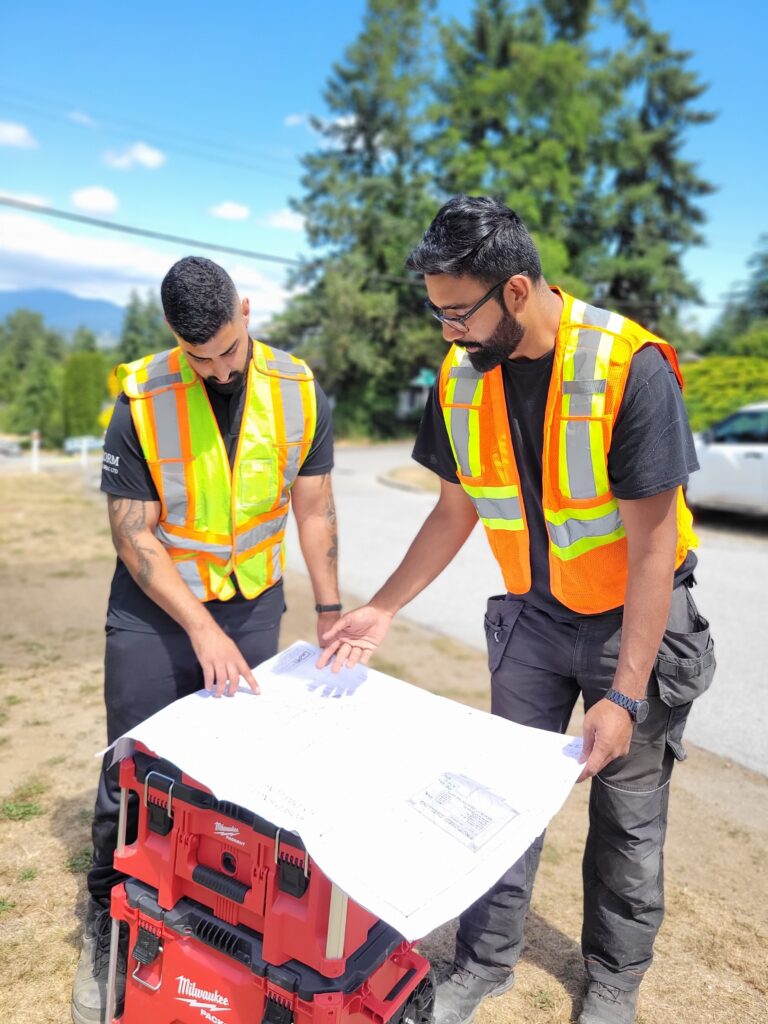Resources
Call us today
Date Last Updated: 30th October 2023
EV Charger Legislation
British Columbia – Provincial
Zero-Emission Vehicles Act
This act requires automakers to meet an escalating annual percentage of new light-duty ZEV sales and leases, reaching: 10% of light-duty vehicle sales by 2025, 30% by 2030, and 100% by 2040. Updated targets have been planned and appear in the CleanBC Roadmap to 2030, though ZEVA has not officially been amended. The planned new targets are: 26% by 2026, 90% by 2030, and 100% by 2035.”
Ministerial Order M104
This order allows persons who are not otherwise public utilities, as well as landlords and strata corporations, to provide EV charging services for compensation. Please note that payment for electricity by kWh still requires a device approved by Measurement Canada, but charging stations have not yet been approved. Rates by the hour, or a flat fee, to use a station are still the conventional methods of placing a rate on charging station use.
HOV Lane Access
This policy allowing EVs access to high occupancy vehcile lanes regardless of the number of passengers. See more details and order the required HOV lane decal on the Ministry of Transportation and Infrastructure site.
Provincial Building Act
The building act was revised in 2016 to define EV chargers as matters ‘out of scope’ under the Building Act. ‘Out of scope’ is defined as “matters… local government can regulate… if they have authority to do so in other statutes.” This gives local governments greater flexibility in making decisions regarding the use of EV charging in new developments.
BC Strata Property Act
Bill 22 amended the Strata Property Act and received royal assent of May 11, 2023. These amendments improve access to EV charging in residential strata buildings by:
- Lowering the voting threshold from 75% to 50% approval for expenditures and changes to common and personal property that are needed to install EV charging stations.
- Requiring strata corporations to obtain an electrical planning report to help understand the building’s electrical capacity and plan for the expansion of EV charging stations.
- Requiring strata corporations to approve owners’ requests to install EV charging stations, at the owner’s expense, if reasonable criteria are met.
- View the press release here: https://news.gov.bc.ca/releases/2023HOUS0019-000465
- Vancouver Island Strata Owners Association article: Changes to the Strata Property Act re Electric Vehicle Charging – Vancouver Island Strata Owners Association (visoa.bc.ca)
Previously, the act was revised in March 2017 under regulation 6.9 to clarify that variable user fees are permitted for the use of strata common property. A consumption based rate may be charged to users to recover expenses as long as it is reasonable and in a bylaw or rule. Examples include electricity usage for those charging electric vehicles.
British Columbia - Municipal
British Columbia - Municipal
City of Burnaby Zoning Bylaw 13903, Amendment Bylaw No. 24, 2018 includes provisions for electric vehicle charging requirements for new residential developments.
- All parking spaces for dwelling units shall include an energized outlet capable of providing Level 2 charging or higher
- Includes single-family homes and multi-family buildings of all sizes
- Exceptions include visitor and secondary suite parking, and parking for existing units
- Bylaw is in effect starting September 1 2018.
See the District of Central Saanich’s Electric Vehicle Infrastructure and Requirements page for EV ready parking in new residential, institutional, commercial and industrial buildings (September 1, 2020)
Additionally, see the District’s EV and E-Bike Strategy.
The City of Coquitlam zoning bylaw has been amended to include EV parking spaces. See Part 714 of the bylaw.
- July 30th 2018. See the requirements guide.
- All new constructions must have one energized outlet capable of L2 charging for every dwelling unit (includes single family and MURBs).
- If the number of parking spaces is less than the number of dwelling units, all residential parking spots must have an energized outlet with Level 2 or higher charging capabilities.
The City of Kamloops adopted a revised zoning bylaw in September 2022 to mandate EV charging requirements in all new residential developments.
As of Jan. 1, 2023, all new residential buildings in the city must have electrical infrastructure to support Level 2 EV charging for a minimum of one parking space per unit. Additionally, for buildings that are over three storeys in height, developers must complete an “EV-capable plan.” This is a strategy that outlines the electrical capacity of a building, prior to construction.
The City of Kamloops council authorized the adoption of the Electric Vehicle (EV) and Electric Bike (E-Bike) Strategy on August 25, 2020. See the strategy here.
Targets include:
- By 2023, all newly constructed off-street residential parking will be EV-ready.
- By 2030, all residential parking in existing apartments will be EV-ready.
- By 2030, most households without access to on-site parking for “at-home” charging will have access to EV charging, through a mix of workplace, on-street, and other forms of public charging (to be measured via surveys and/or other analysis).
The City of Kelowna provides a parking Eco Pass for electric vehicles. Electric vehicles, including plug-in hybrids, can receive a one year eco pass which allows two hours of free parking a day in paid parking areas.
In the Township of Langley’s Zoning Bylaw No. 2500 – Section 107.3, all new residential construction, including single-home dwellings, townhouses and apartments, required one space per dwelling unit to have EV charging requirements, starting from Nov. 4, 2019.
The City of Maple Ridge’s Bylaw No. 4350-1990 – Schedule F requires that:
- Single Detached Residential, Two-Unit Residential, triplex residential, fourplex residential, courtyard residential, Townhouse and Street Townhouse residential use, a minimum of one parking space per dwelling unit shall be provided with roughed-in infrastructure capable of providing Level 2 charging;
- Apartment use, not including Townhouse, in all CD zones as well as in the RM-2, RM-3, RM-4, RM-5, RM-6, C-1, C-2, C-3, C-5, CS-1, H-1, H-2, and CRM zones, each parking space provided for residential use, excluding visitor parking spaces, shall be provided with roughed-in infrastructure capable of providing Level 2 charging;
- Apartment and Townhouse use in all CD zones as well as in the RM-1, RM-2, RM-3, RM-4, RM-5, RM-6, C-1, C-2, C-3, C-5, CS-1, H-1, H-2, and CRM zones, a minimum of 50% of required visitor parking spaces shall be provided with roughed-in infrastructure capable of providing Level 2 charging;
- Commercial uses with 10 or more required off-street parking spaces, a minimum of 10% of the parking spaces shall each be provided with roughed-in infrastructure capable of providing Level 2 charging.
According to the City of Nanaimo’s Off-Street Parking Regulations Bylaw No. 7266 – Section 7.7, a minimum of 25 per cent of all off-street parking spots in any common parking area for multifamily residential housing must have shared access to a Level 2 EV charging, and have an electrical outlet box wired with a separate branch circuit capable of supplying electricity to support both Level 1 and Level 2 charging.
The City of Nelson has amended its zoning bylaw:
- One stall per dwelling unit is required to be EV ready in new single family and multi-unit residential.
- Two stalls per 10 required stalls of new commercial builds are required to be EV ready.
- Starting April 1, 2019, all new buildings that contain at least one residential unit will be required to install a Level 2 (208 to 240 volt) energized outlet to the residential parking spaces. See details here.
- Please view the City of New Westminster’s updated Development Permit Area (DPA) guidelines to learn more about the recommended EV charging infrastructure for new commercial, institutional and industrial buildings.
The City of North Vancouver’s zoning bylaw has been amended to include 100% EV ready parking in multi-unit residential buildings:
- This applies to development or building permit applications accepted for review on or after June 1, 2019.
- All parking spaces in new residential buildings must have a labelled, energized outlet capable of providing Level 2 charging for an electric vehicle.
- This includes all new single family, coach houses, duplexes, triplexes and apartments, as well as parking spaces for shared vehicles.
- Secondary suites are not included.
- EV energy management systems or “load sharing” can be used to meet the requirements
The Electric Vehicle Charging Infrastructure Policy, updated in March, 2021, covers multi-family, commercial, and industrial developments, as well as bicycle storage.
- Multi-family in District of North Vancouver:
- All parking stalls (not including visitor parking) must feature energized outlets* capable of providing Level 2 charging or higher.
- Commercial/Industrial in District of North Vancouver:
- At least 20% of parking stalls (not including accessible parking) must feature energized outlets* capable of providing Level 2 charging or higher,
- All accessible parking stalls must feature energized outlets capable of providing Level 2 charging or higher.
- Bike storage:
- In addition to these vehicle requirements, all secure bicycle storage must include Level 1 (110v) electric outlets for electric bicycle charging, as stipulated in the Bicycle Parking Policy and End-of-Trip Facilities Policy.
The City of Port Coquitlam’s Zoning Amendment Bylaw 4035 requires EV charging in new builds (residential and mixed use):
- In effect Jan 23 2018.
- For a residential building other than a building with a common parking area, one parking space per dwelling unit shall be provided with roughed-in electric vehicle charging infrastructure including an electrical outlet box located within 3 metres of the unit’s required parking space.
- For a residential building with a common parking area, a separate single utility electrical meter and disconnect shall be provided in line with the electrical panel(s) intended to provide for charging of electric vehicles located within 3 metres of the unit’s required parking space.
- In a mixed-use building including residential uses and a common parking area, a separate single utility electrical meter and disconnect shall be provided in line with the electrical panel(s) intended to provide for charging of electric vehicles located within 3 metres of the unit’s required parking space.
The City of Port Moody’s EV ready requirements appear in bylaw 2937 Section 6.11 March 1, 2019.
- See the technical bulletin here.
- All spaces in new residential constructions require an energized outlet capable of L2 charging.
- 20% of spaces in new commercial constructions require an energized outlet capable of L2 charging.
The City of Richmond’s Zoning Bylaw 8500 requires EV charging in new builds (residential only), revising bylaw 9756.
- October 15, 2017.
- 100% of new residential parking spaces, excluding those provided for visitors use, shall have access to an adjacent energized outlet capable of providing Level 2 charging.
In the District of Saanich, Development and Building Permit applications for new buildings applied for on or after September 1, 2020 will need to demonstrate compliance with the following Bylaws related to Electric Vehicle (EV) charging infrastructure requirements:
- Zoning Bylaw [PDF – 17 MB] 8200, section 7: Off-Street Parking, which establishes electric vehicle (EV) charging infrastructure requirements for parking in new residential, institutional, commercial and industrial buildings.
- Electric Vehicle Off-Street Parking Bylaw [PDF – 24 KB], 2020, No. 9644, which establishes requirements for performance of Electric Vehicle Energy Management Systems and building and occupancy permit requirements.
- EV Infrastructure Requirements Technical Bulletin. [PDF – 276 KB]
See more on District of Saanich’s EV Infrastructure Requirements page.
Zoning bylaw 2200, 2011, has been amended to require:
- 30% of the required off-street parking spaces for apartment dwelling units shall have shared access to an energized outlet capable of providing level 2
charge that delivers a minimum of 1.7kW of power. Energized outlets provided at visitor parking spaces will not contribute towards this
requirement. 100% of the required off-street parking spaces for apartment dwelling units shall be roughed in for electrification, with conduit terminating
at a junction box at each location. - For two unit dwellings, triplexes, townhomes, or cottage clusters: A minimumof 1 required off-street parking space per dwelling unit shall have access to an
energized outlet capable of providing level 2 that can deliver a minimum of 3.3kW of power. - At least 1 required off-street parking space per single unit shall have access to an energized outlet capable of providing level 2 charge that can deliver a
minimum of 3.3kW of power. - 10% of the required off-street parking spaces in new commercial or industrial developments shall be provided with access to an energized outlet capable of
providing level 2 charge that can deliver a minimum of 3.3kW of power. - Amended to require that 100% of the required off-street parking stalls in any shared parking areas for multiple unit residential use shall be provided with electric vehicle charging infrastructure.
The City of Surrey’s zoning bylaw was amended on February 25, 2019 to require Electric Vehicle (EV) charging infrastructure in ALL new residential and commercial developments.
- February 25, 2019. See the technical bulletin here.
- 100% of residential parking spaces in new residential developments must each have an installed energized electrical outlet capable of providing Level 2 charging for an electric vehicle. This requirement applies to both single-family and multiple unit residential dwellings.
- 50% of visitor parking spaces in multiple unit residential developments must each have an installed energized electrical outlet capable of providing Level 2 charging for an electric vehicle.
- 20% of parking spaces in new commercial developments must each have an installed energized electrical outlet capable of providing Level 2 charging for an electric vehicle.
The City of Vancouver’s Building Code Bylaw 10908 requiring EV charging in new builds (both commercial and residential), revised bylaw Electric Vehicle Charging s 10.2.3.
- This bylaw was updated on March 14, 2018 to increase the percentage of EV-ready stalls in multi-unit residential buildings from 20% to 100%
- For new buildings current bylaw requires:
- 1 EV-ready stall in single-family homes with garages
- 10% of stalls be EV-ready in commercial buildings
- 100% of stalls be EV-ready in multi-unit residential buildings
As per the Town of View Royal’s Zoning Bylaw No. 900 – Section 5.13, every commercial or multi-unit residential construction with more than 100 parking spots must provide an accessible electric vehicle charging station on the premises for patrons or residents.
This bylaw was adopted in February 2021.
The District of West Vancouver Zoning bylaw parking regulations require that:
- Parking spaces required for single family homes, duplexes, secondary or detached secondary suites shall include an energized outlet that is capable of providing level 2 charging for an electric vehicle and labelled for the use of electric vehicle charging.
- Multi-unit residential buildings: for new dwelling units, all parking spaces for residential use, except visitor parking, shall include an energized outlet that is: (a) capable of providing Level 2 charging for an electric vehicle; (b) labelled for the use of electric vehicle charging.
The City of White Rock has proposed changes to its Zoning Bylaw, 2012, No. 2000.
On March 18, 2021, the Environmental Advisory Committee presented recommendations that would require all resident parking stalls to be Level 2 EV-ready in new multi-unit residential buildings and 50 per cent of visitor parking stalls to be Level 2 EV-ready in new multi-unit residential buildings.

Contact Us Today for a Free Quote
We look forward to discussing how we can professionally complete your project on time and on budget!






